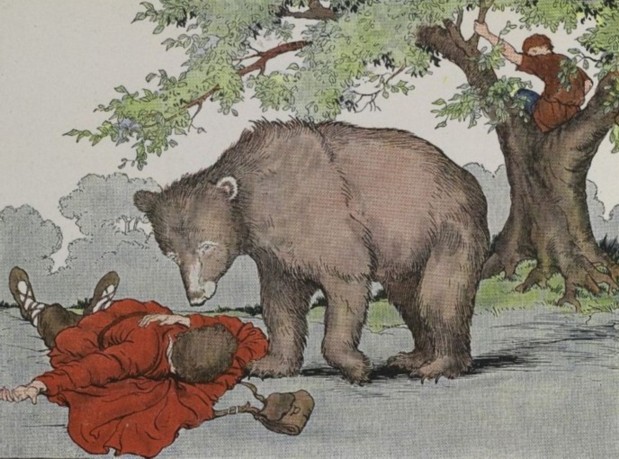Today's fable is Perry #65, the story of two men whose friendship was put to the test when they ran into a bear unexpectedly on their travesl! At the Aesopus wiki, you can see a complete list of the versions of this fable that I have collected. This is a fable that enters into the Latin tradition by being included in the poems of Avianus. Avianus, however, is notoriously difficult to read, so I've decided to include here instead a very nice iambic poem by the Renaissance poet Caspar Barth:
Sodalitate mutua
Viam duo unam iniverant,
Fide data, ut periculis
Iuvaret alter alterum.
Parum viae cum itum foret
Fit obvia ursa: quae, prius
Inire quam fugam pote,
Prope ingruit. Tum in arborem
Levatus ille subfugit,
Supinus iste corruit,
Timore mortuum exprimens.
At ursa cum putaret hunc
Neci, olim obisse, traditum,
Anhelitum ore sublegens
Nec invenire eum potens,
Metu premente frigido.
Nec alterum altam in arborem
Pote esset usque consequi,
Utrumque liquit innocem.
Ibi ille qui alta in arbore
Periculum insuper sui
Amici habebat; Optime,
Quid, inquit, atra belua
Profundam in aurem, obambulans,
Tibi locuta sit, cedo.
At alter; a sodalibus
Cavere deinde ad hunc modum
Monebat infidelibus.
Pericla ni probant, fidem
Dare hanc sodalibus cave.
Here it is written out in segmented style to make it easier to follow, rearranging the Latin word as necessary to make the syntax more clear. Also, be careful with cedo - it is an imperative form meaning "come on! out with it!" (and so it is not a first-person indicative verb you might take it for at first).
duo
viam unam iniverant
sodalitate mutua,
fide data
ut iuvaret alter alterum
periculis.
cum itum foret
parum viae,
fit obvia ursa:
quae,
prius quam pote
inire fugam,
prope ingruit.
Tum
ille subfugit
in arborem levatus ,
iste corruit supinus,
mortuum exprimens timore.
at ursa
cum putaret
hunc olim obisse,
traditum neci,
sublegens anhelitum ore
et non potens invenire eum,
frigido metu premente.
et non pote esset
usque consequi alterum
altam in arborem,
liquit utrumque innocem.
ibi ille
qui habebat periculum
alta in arbore
insuper sui amici,
inquit:
"Optime, cedo,
quid
atra belua
obambulans
tibi locuta sit
profundam in aurem?"
at alter:
"monebat
deinde cavere ad hunc modum
a sodalibus infidelibus."
cave
fidem hanc dare
sodalibus,
ni probant pericla.
I like the way the quick-witted friend not only manages to escape the bear by playing dead, but also manages to come up with a witty comeback to his would-be friend as well!
For an image, here is an illustration from Milo Winter's Aesop:

Some dynamic content may not display if you are reading this blog via RSS or through an email subscription. You can always visit the Bestiaria Latina blog to see the full content, and to find out how to subscribe to the latest posts.
No comments:
Post a Comment